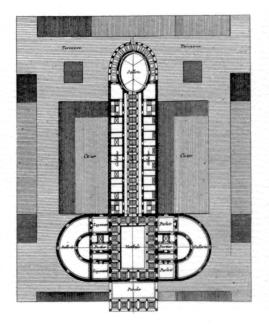
In the 18th century, French architect Claude-Nicolas Ledoux conceived an ideal city — perhaps too ideal. It contained no hospitals or theaters but included a “shelter of the poor man,” a “Pacifère” where quarrels could be settled peaceably, and, most notably, an “Oïkéma,” or house of sexual instruction, which Allan Braham calls “one of the most extreme instances of Ledoux’s gift for architectural metaphor.”
While we’re on this subject: In William Wycherley’s 1675 comedy The Country Wife, the word china becomes a bawdy metaphor, which makes the dialogue livelier than it first appears:
Lady Fidget: And I have been toiling and moiling, for the prettiest Piece of China, my Dear.
Mr. Horner: Nay, she has been too hard for me, do what I could.
Mrs. Squeamish: Oh, Lord, I’ll have some China too, good Mr. Horner, don’t think to give other People China, and me none, come in with me too.
Mr. Horner: Upon my Honour I have none left now.
Mrs. Squeamish: Nay, nay, I have known you deny your China before now, but you shan’t put me off so, come —
Mr. Horner: This Lady had the last there.
Lady Fidget: Yes indeed, Madam, to my certain Knowledge he has no more left.
Mrs. Squeamish: O, but it may be he may have some you could not find.
Lady Fidget: What d’ye think if he had had any left, I would not have had it too? for we Women of Quality never think we have China enough.
Mr. Horner: Do not take it ill, I cannot make China for you all, but I will have a Roll-waggon for you too, another time.
Mrs. Squeamish: Thank you, dear Toad.
Lady Fidget: (to Horner, aside) What do you mean by that promise?
Mr. Horner: Alas, she has an innocent, literal Understanding.
(Thanks, Stephenson.)
